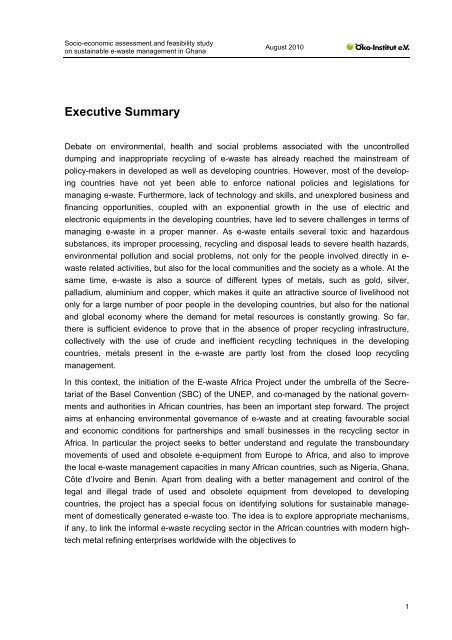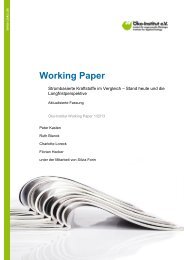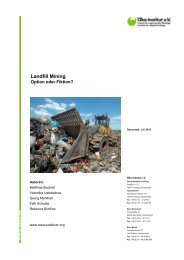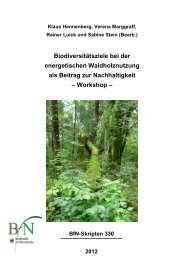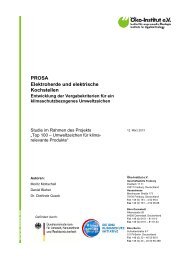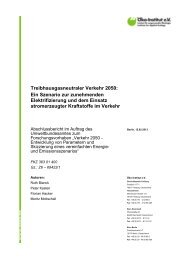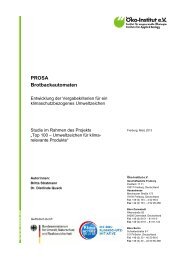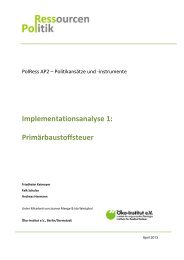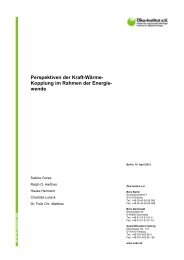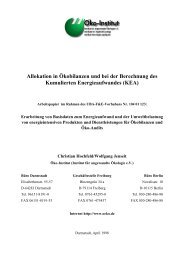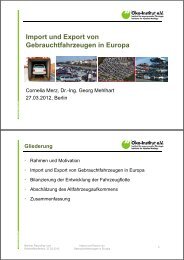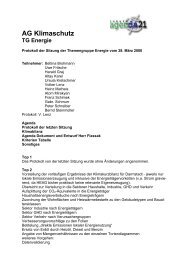Socio-economic assessment and feasibility study on - Öko-Institut eV
Socio-economic assessment and feasibility study on - Öko-Institut eV
Socio-economic assessment and feasibility study on - Öko-Institut eV
You also want an ePaper? Increase the reach of your titles
YUMPU automatically turns print PDFs into web optimized ePapers that Google loves.
<str<strong>on</strong>g>Socio</str<strong>on</strong>g>-<str<strong>on</strong>g>ec<strong>on</strong>omic</str<strong>on</strong>g> <str<strong>on</strong>g>assessment</str<strong>on</strong>g> <str<strong>on</strong>g>and</str<strong>on</strong>g> <str<strong>on</strong>g>feasibility</str<strong>on</strong>g> <str<strong>on</strong>g>study</str<strong>on</strong>g><br />
<strong>on</strong> sustainable e-waste management in Ghana<br />
Executive Summary<br />
August 2010<br />
Debate <strong>on</strong> envir<strong>on</strong>mental, health <str<strong>on</strong>g>and</str<strong>on</strong>g> social problems associated with the unc<strong>on</strong>trolled<br />
dumping <str<strong>on</strong>g>and</str<strong>on</strong>g> inappropriate recycling of e-waste has already reached the mainstream of<br />
policy-makers in developed as well as developing countries. However, most of the developing<br />
countries have not yet been able to enforce nati<strong>on</strong>al policies <str<strong>on</strong>g>and</str<strong>on</strong>g> legislati<strong>on</strong>s for<br />
managing e-waste. Furthermore, lack of technology <str<strong>on</strong>g>and</str<strong>on</strong>g> skills, <str<strong>on</strong>g>and</str<strong>on</strong>g> unexplored business <str<strong>on</strong>g>and</str<strong>on</strong>g><br />
financing opportunities, coupled with an exp<strong>on</strong>ential growth in the use of electric <str<strong>on</strong>g>and</str<strong>on</strong>g><br />
electr<strong>on</strong>ic equipments in the developing countries, have led to severe challenges in terms of<br />
managing e-waste in a proper manner. As e-waste entails several toxic <str<strong>on</strong>g>and</str<strong>on</strong>g> hazardous<br />
substances, its improper processing, recycling <str<strong>on</strong>g>and</str<strong>on</strong>g> disposal leads to severe health hazards,<br />
envir<strong>on</strong>mental polluti<strong>on</strong> <str<strong>on</strong>g>and</str<strong>on</strong>g> social problems, not <strong>on</strong>ly for the people involved directly in ewaste<br />
related activities, but also for the local communities <str<strong>on</strong>g>and</str<strong>on</strong>g> the society as a whole. At the<br />
same time, e-waste is also a source of different types of metals, such as gold, silver,<br />
palladium, aluminium <str<strong>on</strong>g>and</str<strong>on</strong>g> copper, which makes it quite an attractive source of livelihood not<br />
<strong>on</strong>ly for a large number of poor people in the developing countries, but also for the nati<strong>on</strong>al<br />
<str<strong>on</strong>g>and</str<strong>on</strong>g> global ec<strong>on</strong>omy where the dem<str<strong>on</strong>g>and</str<strong>on</strong>g> for metal resources is c<strong>on</strong>stantly growing. So far,<br />
there is sufficient evidence to prove that in the absence of proper recycling infrastructure,<br />
collectively with the use of crude <str<strong>on</strong>g>and</str<strong>on</strong>g> inefficient recycling techniques in the developing<br />
countries, metals present in the e-waste are partly lost from the closed loop recycling<br />
management.<br />
In this c<strong>on</strong>text, the initiati<strong>on</strong> of the E-waste Africa Project under the umbrella of the Secretariat<br />
of the Basel C<strong>on</strong>venti<strong>on</strong> (SBC) of the UNEP, <str<strong>on</strong>g>and</str<strong>on</strong>g> co-managed by the nati<strong>on</strong>al governments<br />
<str<strong>on</strong>g>and</str<strong>on</strong>g> authorities in African countries, has been an important step forward. The project<br />
aims at enhancing envir<strong>on</strong>mental governance of e-waste <str<strong>on</strong>g>and</str<strong>on</strong>g> at creating favourable social<br />
<str<strong>on</strong>g>and</str<strong>on</strong>g> <str<strong>on</strong>g>ec<strong>on</strong>omic</str<strong>on</strong>g> c<strong>on</strong>diti<strong>on</strong>s for partnerships <str<strong>on</strong>g>and</str<strong>on</strong>g> small businesses in the recycling sector in<br />
Africa. In particular the project seeks to better underst<str<strong>on</strong>g>and</str<strong>on</strong>g> <str<strong>on</strong>g>and</str<strong>on</strong>g> regulate the transboundary<br />
movements of used <str<strong>on</strong>g>and</str<strong>on</strong>g> obsolete e-equipment from Europe to Africa, <str<strong>on</strong>g>and</str<strong>on</strong>g> also to improve<br />
the local e-waste management capacities in many African countries, such as Nigeria, Ghana,<br />
Côte d’Ivoire <str<strong>on</strong>g>and</str<strong>on</strong>g> Benin. Apart from dealing with a better management <str<strong>on</strong>g>and</str<strong>on</strong>g> c<strong>on</strong>trol of the<br />
legal <str<strong>on</strong>g>and</str<strong>on</strong>g> illegal trade of used <str<strong>on</strong>g>and</str<strong>on</strong>g> obsolete equipment from developed to developing<br />
countries, the project has a special focus <strong>on</strong> identifying soluti<strong>on</strong>s for sustainable management<br />
of domestically generated e-waste too. The idea is to explore appropriate mechanisms,<br />
if any, to link the informal e-waste recycling sector in the African countries with modern hightech<br />
metal refining enterprises worldwide with the objectives to<br />
1


